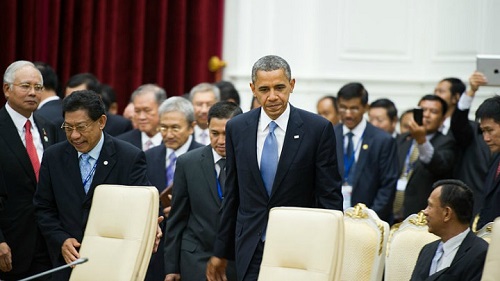Obama In Laos: Can He Win Six Million Hearts To Trump Beijing?
Source: Asean Today
When Barack Obama travelled to Cuba, he was the first U.S president in almost 90 years to set foot in the landlocked nation. His arrival was said to be, “a historic visit“. And given the enormous community of Cuban-Americans in the U.S, it was evident that the tour had attracted a lot more attention than Obama’s upcoming trip to Laos, another communist country. However, in the current geopolitical climate, the upcoming Laos visit represents a highly strategic move.
For three days in early September, Obama will take part in the U.S-ASEAN and East Asia summits in the capital city of Vientiane. In the context of this programme he will have a bilateral meeting with Laos President, Bounnhang Vorachith, and attend a town hall session with young leaders.
On the surface, a visit to a country with only six million people earning on average just over $1,000 per year seems minor. However, Laos now has a pivotal role in relations between China, the U.S and the rest of Southeast Asia. And in this climate, Beijing is working hard to expand its influence.
Chinese influence
In the late 1990s, China began large-scale investment in Laos by funding construction projects, especially a 20,000-seat stadium and the main thoroughfare in Vientiane. China is now so close to achieving its overarching goals in Laos that, in 2014, the country’s total investment in Laos had reached $5.1 billion, overtaking Vietnam and Thailand for the first time.
In 2015, China launched a communications satellite for Laos at a cost of $250m. Add to that the building of a broad range of shopping malls, hotels and entertainment centres on land provided by the Lao government. Beijing has also put a lot of money into commercial agricultural projects.
Moreover, the Special Economic Zones (SEZ) which Laos set up in the early 2000s to attract foreign investment are filled with Chinese companies. In these zones, mostly in border areas, the Lao government decided to let investors enjoy tax breaks and easy import and export regulations for goods they produce. Sadly the old ways of bribing government and party officials to be able to launder money took hold. Any activity intended to boost rural development turned into projects with no or little value to Laos’ citizens.
One of the most ominous examples is the Kings Romans Casino, built in a SEZ with easy access to gambling and prostitution,”Here, you can get whatever you want, as long as you have money,” say reports. Most of the casinos’ employees are Chinese.
Countering China’s assertiveness
But the tide may be turning. “The priorities that Laos officials outlined this year also reflect the country’s sense of what it would like to promote in the regional agenda… the focus on narrowing the development gap and a work plan for the Initiative for ASEAN Integration… directly benefits Vientiane,” wrote Prashanth Parameswaran, associate editor at The Diplomat.
Lao Prime Minister Thongloun Sisoulith is as a multilateralist. He intends to improve ties with neighbouring countries, as well as the U.S and the rest of Southeast Asia. Many analysts think Laos now has many more interests than playing a puppet in a dispute in which it is not directly involved.
Murray Hiebert, a Southeast Asia expert at the Center for Strategic and International Studies, noted, “a Communist Party congress in Laos removed a party chief considered as pro-Chinese and replaced him with one who appears to be more evenhanded in his views about China and Vietnam”. Times, it seems, are changing.
Obama’s strategy
During his time in the White House, Barack Obama has sought to rebalance American defence and economic policy to counter China’s rising influence in the Asia-Pacific region. However, Washington needs the support from a China-leaning country to forge a regional consensus on how to deal with Beijing’s assertiveness in the South China Sea.
External influences have manipulated Laos many times throughout its history, but now the time has come to live as a fully-independent nation. And a country which is more broad-minded, and better educated, will have many more chances to win Laotian hearts.

